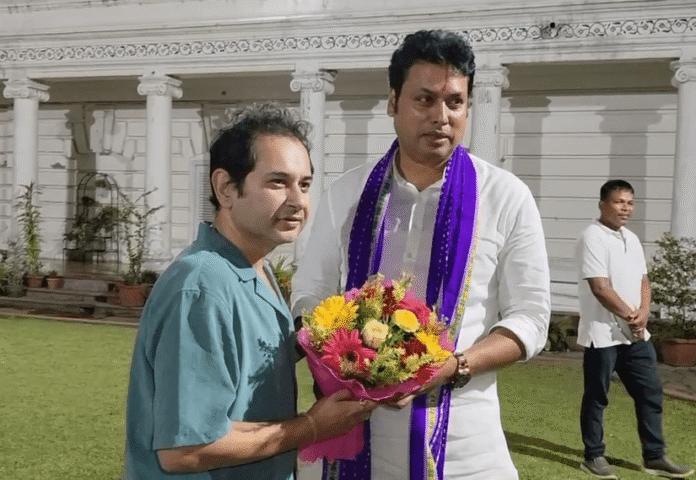
Biplab & Pradyot’s meeting sparks political buzz in Tripura
In a surprising turn of events, a closed-door meeting between BJP MP Biplab Deb and Tipra Motha chief Pradyot Debbarma at Ujjayanta Palace in Agartala has sent shockwaves through the political circles of Tripura. The sudden meeting has sparked speculation and raised eyebrows, particularly in the wake of recent threats by a Tipra MLA to withdraw support from the BJP-led government in the state.
The meeting, which was reportedly a “birthday visit” to wish Pradyot Debbarma on his birthday, has led many to question the true nature of the discussion between the two leaders. The fact that the meeting was held at Ujjayanta Palace, a historic palace that has been the seat of power for the royal family of Tripura, has added to the intrigue.
Pradyot Debbarma, the chief of Tipra Motha, a regional party that has been a key player in Tripura’s politics, has been vocal about his party’s demands for greater representation and empowerment of the indigenous people of Tripura. His party has been a key ally of the BJP-led government in the state, but tensions have been building in recent times over the implementation of the Tiprasa Accord, a historic agreement signed in 2019 to address the demands of the indigenous people.
The meeting between Biplab Deb and Pradyot Debbarma has been seen as a significant development in the wake of recent threats by a Tipra MLA to withdraw support from the government. The MLA, Rebati Mohan Tripura, had threatened to pull his party’s support from the government over the issue of the Tiprasa Accord, which he claimed was not being implemented as per the agreement.
The Tiprasa Accord was signed in 2019 between the government and the indigenous people of Tripura, including the Tripura Tribal Autonomous District Council (TTADC) and the Indigenous Peoples Front of Tripura (IPFT). The accord aimed to address the long-standing demands of the indigenous people, including greater representation in the government and empowerment of their communities.
However, the implementation of the accord has been slow, and the indigenous people have been growing increasingly frustrated with the lack of progress. The meeting between Biplab Deb and Pradyot Debbarma has raised questions about the true nature of the discussion and whether it was a genuine attempt to resolve the issues or simply a backdoor attempt to undermine the Tiprasa Accord.
The BJP has been trying to pacify the situation by claiming that the meeting was simply a birthday visit and that there was no political agenda involved. However, the timing of the meeting and the fact that it was held at Ujjayanta Palace has led many to question the party’s intentions.
The meeting has also sparked tensions between the BJP and the Tipra Motha, with some party leaders accusing the Tipra Motha of trying to create divisions within the ruling coalition. The Tipra Motha has denied these allegations, claiming that the party is committed to its goals of empowering the indigenous people of Tripura.
The development has also raised questions about the future of the Tiprasa Accord and the fate of the indigenous people of Tripura. The accord was seen as a major step towards addressing the long-standing demands of the indigenous people, but its implementation has been slow and patchy.
The meeting between Biplab Deb and Pradyot Debbarma has sent a clear signal that the political landscape of Tripura is complex and volatile. The state is home to a diverse range of ethnic and linguistic groups, and the politics of the state are heavily influenced by the tensions between these groups.
In recent times, the state has seen a surge in political activism, with various groups demanding greater representation and empowerment. The meeting between Biplab Deb and Pradyot Debbarma has added to the political buzz, and it remains to be seen how the situation will unfold in the coming days.
As the political landscape of Tripura continues to evolve, one thing is clear: the meeting between Biplab Deb and Pradyot Debbarma has sent a clear signal that the politics of the state is complex and volatile, and that the future of the Tiprasa Accord and the indigenous people of Tripura hangs in the balance.






